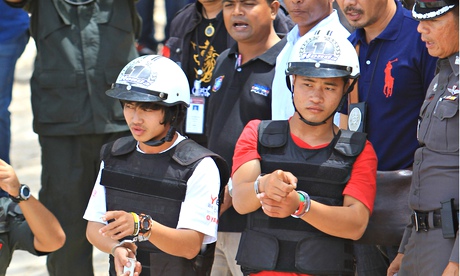
Further doubts have emerged about the police investigation into the murder of two British backpackers in Thailand, after a Burmese official said the two migrant workers arrested for the crime had now retracted the confessions that were “beaten out of them”.
Amid a confusing picture fresh doubts have also been raised about forensic evidence supporting the case.
Thailand’s most prominent forensic investigator has questioned why an expert in the area was not used to collect samples following the discovery on 15 September of the murdered Britons, Hannah Witheridge and David Miller, on Koh Tao island.
On Thursday reports said that a Burmese embassy official, Aung Myo Thant, described as a lawyer, had now formally retracted the statements of the Burmese suspects, Zaw Lin and Win Zaw Htun, both 21. He had reported the concerns to the Burmese embassy, the Bangkok Post said, citing Burma’s 7Day newspaper.
He was quoted as saying of the suspects: “They told me that they were on the beach that night drinking and singing songs. They said they didn’t do it, that the Thai police beat them until they confessed to something they didn’t do. They’re pleading with the Burmese government to look into the case and find out the truth. They were a really pitiful sight. Their bodies had all sorts of bruises.”
Earlier this week the Burmese men said they had been beaten by police and threatened with electrocution to secure their confessions.
Khunying Porntip Rojanasunan, head of Thailand’s forensic science institute, reportedly asked why an expert was not used to collect samples following the murders and why qualified experts seemed not to have been involved in the case, which involved police are were also relying on DNA evidence.
Police failing to call a forensic pathologist to oversee officers collecting evidence was a “weak point” in the investigation, she said, according to Burma’s 7Day newspaper, citing a Thai news agency. She added: “A case of two murdered people certainly needs a forensic physician.”
Another Thai paper, The Nation, said public prosecutors had returned the police report, asking officers to supply “more crucial information”.
The paper quoted Parinya Sirisarakarn, of Thailand’s national human rights commission, also querying some of the forensic evidence. He said he had also visited the suspects and seen that they showed signs of “the police not treating them properly”. However, he said the pair, speaking to him, had maintained their confessions.
According to police, the two men did confess to the killings. They were believed to have found the Britons embracing on a beach. They allegedly struck Miller, 24, on the head, leaving him to drown in the surf, before raping and killing 23-year-old Witheridge.
However, rights groups in Thailand and elsewhere have expressed worries about the police investigation, fearing the migrant workers might be providing make convenient scapegoats so that officials can declare the case closed to assist Thailand’s vital tourist industry. On Thursday
Amnesty International has called for an independent investigation into allegations that the suspects were mistreated, and for the suspects to get a fair trial.
Richard Bennett, head of Amnesty’s Asia-Pacific region, said: “The pressure to be seen to be solving an appalling crime that has garnered considerable attention should not result in the violation of rights, including a fair trial.”
According to The Nation, in the aftermath of the murders there was a significant drop in tourist arrivals to the island. However numbers were now picking up again, it said.
Migrant labour activists in Thailand have expressed concern that those who have apparently held confidential talks with the accused, such as the so-called lawyer from by the Burmese embassy and Sirisarakarn from the national human rights commission, had gone on to speak publicly about the two suspects and what they discussed.
Such information can jeopardise a fair trial for those accused, said Andy Hall, a British activist in Thailand, who expressed concern over the media storm relating to the case and possible resulting “trial by press”.
As many as 4 million Burmese migrants currently work in Thailand and it is not uncommon for them to face trouble from Thai police. Hall told the Guardian: “Migrant workers, both irregular and regular, are routinely and unlawfully detained, arrested and extorted in their everyday lives by law enforcement officials whether at their homes, workplaces, when resting and travelling, and even during deportation processes when they are literally sold to ethnic border guards.”
Being scapegoated for crimes committed by others is just one of the many threats faced by migrant workers in Thailand, activists allege. In a statement issued this week the Migrant Workers Rights Network (MWRN), which represents nearly 4,000 Burmese labourers in Thailand, said labourers face “serious challenges” while working in Thailand, ranging from confiscated passports and work permits to unlawful arrest, unfair dismissals, extortion, deportation and the risk of being sold to work on Thai fishing boats or as sex workers, “where they are forced as human trafficking victims to work as slaves”.







